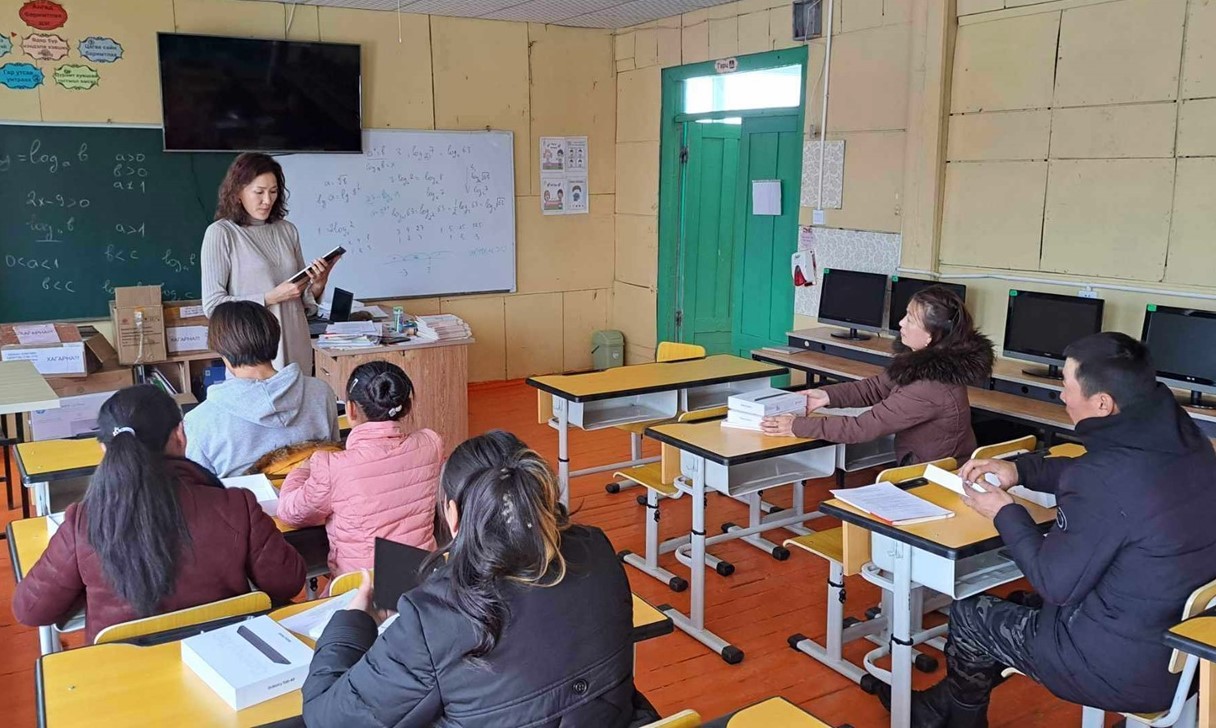Integrating Pasture With Classroom Learning
Bayantes soum, located in Zavkhan province, sits along the Tes river near Mongolia’s northwestern border. This region is known for its harsh winters, with temperatures often plunging below -30°C and heavy snowfall being a frequent occurrence. Let me tell you story of a teacher who, despite these extreme conditions, managed to successfully deliver a training program for young herders. Her name is D. Ankhbayar, an Information Technology teacher and ESEL teacher/ counselor at Bayantes soum general secondary school.
Teacher Ankhbayar’s innovative approach of using bagh governors as mobile trainers has proven to be an effective way to improve the quality of blended learning and ensure that each student is reached.
The ESEL training, conducted as part of the “Entrepreneurship-Focused Socio-Emotional Skills for the Most Vulnerable Youth in Rural Mongolia” project, is unique in offering opportunities for students in grades 8-12 as well as out-of-school youth aged 14-25 under the Lifelong Learning Program.
There are numerous examples of successful engagement with the ESEL program through a blended approach that combines both classroom and non-classroom learning, participation in Pitch competitions, and the realization of innovative project ideas.
This training course provides each student with a tablet preloaded with course content, along with internet and phone access. Trainers also use the tablets to deliver a blend of distance and in-person training. This innovative course, which bridges distance and time, has been successfully implemented in soums and is already showing positive results. In practice, young herders using this blended learning approach can listen to and watch lessons while herding livestock or helping with household chores on the farm. They can complete assignments, send them to their teachers, and ask questions over the phone during work breaks.

D.Ankhbayar became an ESEL teacher/ counselor in 2021. With extensive experience as a trainer, she has conducted ESEL training for high school students in grades 8-12 in the classroom, as well as for young people aged 14-25 through blended learning. In October 2023, she completed her training to become a certified blended learning trainer. Since then, she has been delivering high-quality training sessions that actively engage every student. Recognizing the unique challenges of remote teaching, she also thought to enlist the help of her soum bagh governors to support her students. She then presented the idea of organizing ESEL blended learning to the leaders of Bayantes soum, the project soum level counsel and the bagh governors. Her proposal was supported by the governors of four baghs in Bayantes soum, and they developed a plan to collaborate in improving the education and knowledge of the youth in their soum.
To enhance the understanding of the bagh governors, teacher D. Ankhbayar, Education Manager D.Gereljargal, and Principal Ch. Dashkhuu of Bayantes soum school organized a one-day training session on ESEL blended learning. The training aimed to provide knowledge and clarity about the blended learning approach. Additionally, the school awarded certificates to the bagh governors, recognizing them as “mobile trainers,” which helped ensure their motivation and sense of responsibility. Twenty blended learning students from Bayantes soum studied successfully without any interruptions from November 2023 to January 2024. Three students from the class formed a team and wrote a project proposal titled “Furniture Production” and participated in the Pitch-7 competition held in March 2024. Their proposal was selected and received funding.
ESEL teacher and counseller Ankhbayar said, “The Project Soum Level Counsel and bagh governors played a crucial role in ensuring the training was successfully implemented. In addition to the teachers, the bagh governors and local authorities showed great care for the students, visiting their homes and offering encouragement. The support and attention from so many people made the students feel that they had to study hard and do their best.” There were also many challenges during the training. Seven out of the 20 students in the class lived in an area with no cell phone network during the winter. To stay connected, they would travel to a location with a signal and speak to their teacher on the phone 1-2 times a week. If the teacher was unavailable, the students would reach out to the bagh governor with their questions.
For example, “Bujir” bagh governor and mobile trainer, D.Badamgarav, drove 40 km with the students to a location with internet to help them upload their assignment to Google Classroom, and then returned them home. Designating bagh governors as mobile trainers made the work of the trainers easier. Most importantly, students living 30-90 km away from the soum center were able to submit their assignments without interruption. The “Entrepreneurship-Focused Socio-Emotional Skills for the Most Vulnerable Youth in Rural Mongolia” project offered valuable opportunities for young people, eager to learn but living in remote areas, to study, develop, and enhance their skills.
This training, which combines pastoral settings with classrooms and is not constrained by distance or location, will continue to offer opportunities to even more young people.

